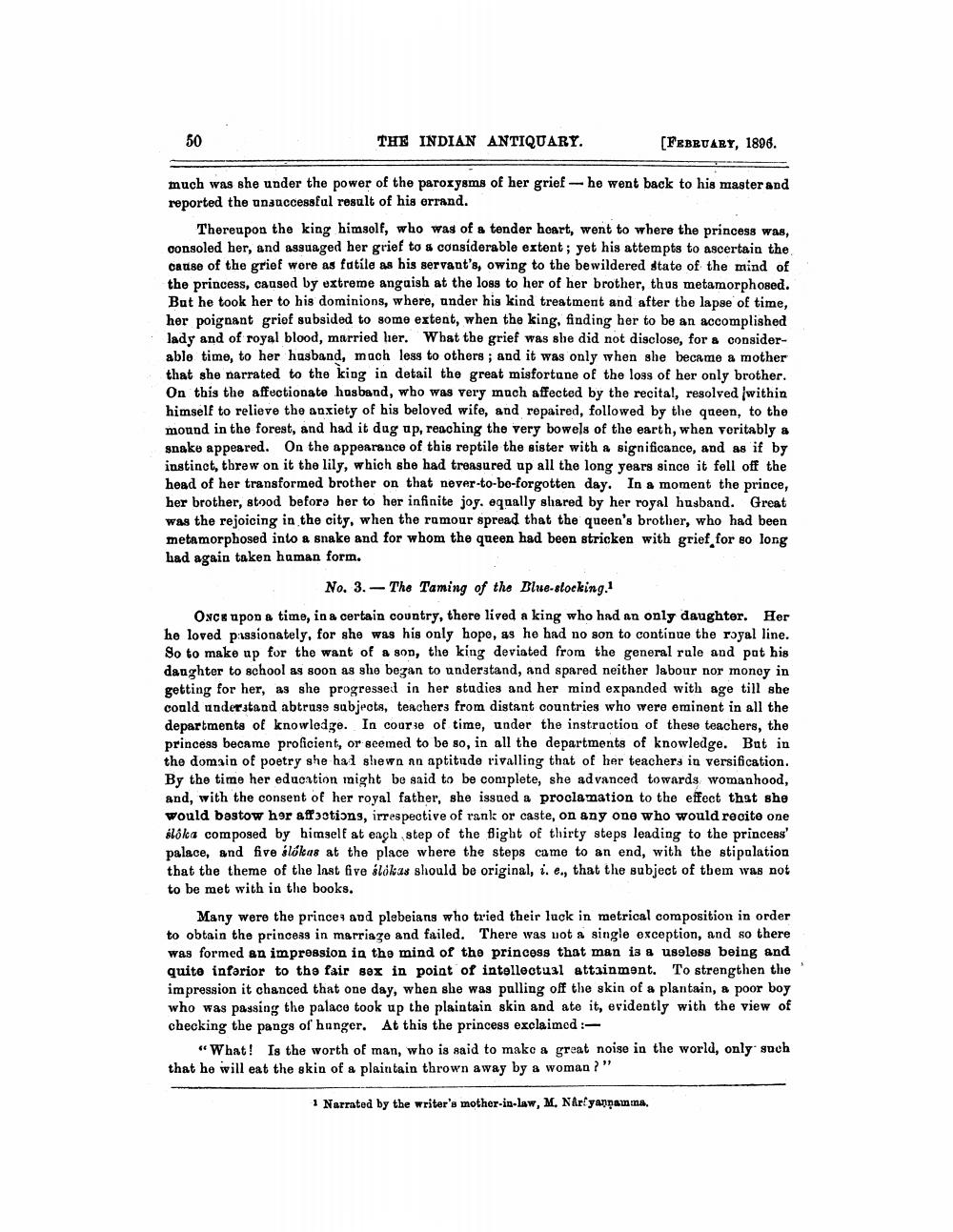________________
50
THE INDIAN ANTIQUARY.
[FEBRUARY, 1896.
much was she under the power of the paroxysms of her grief - he went back to his master and reported the unsuccessful result of his errand.
Thereupon the king himself, who was of a tender heart, went to where the princess was, consoled her, and assuaged her grief to a considerable extent; yet his attempts to ascertain the cause of the grief wore as fatile as his servant's, owing to the bewildered state of the mind of the princess, caused by extreme anguish at the loss to her of her brother, thus metamorphosed. But he took her to his dominions, where, ander his kind treatment and after the lapse of time, her poignant grief subsided to some extent, when the king, finding her to be an accomplished lady and of royal blood, married lier. What the grief was she did not disclose, for a considerable time, to her husband, mach less to others; and it was only when she became a mother that she narrated to the king in detail the great misfortune of the loss of her only brother. On this the affectionate husband, who was very much affected by the recital, resolved /within himself to relieve the anxiety of his beloved wife, and repaired, followed by the queen, to the mound in the forest, and had it dug up, reaching the very bowels of the earth, when veritably a snaku appeared. On the appearance of this reptile the sister with a significance, and as if by instinct, threw on it the lily, which she had treasured up all the long years since it fell off the head of her transformed brother on that never-to-bo-forgotten day. In a moment the prince, her brother, stood befora her to her infinite jog. equally shared by her royal husband. Great was the rejoicing in the city, when the ramour spread that the queen's brother, who had been metamorphosed into a snake and for whom the queen had been stricken with grief for so long had again taken human form.
No. 3. - The Taming of the Blue-slocking. Once upon a time, in a certain country, there lived a king who had an only daughter. Her he loved passionately, for she was his only hope, as he had no son to continue the royal line. So to make up for the want of a son, the king deviated from the general rule and pat his daughter to school as soon as she began to understand, and spared neither labour nor monoy in getting for her, as she progressed in her studies and her mind expanded with age till she could understand abtruse subjects, teachers from distant countries who were eminent in all the departments of knowledge. In course of time, under the instruction of these teachers, the princess became proficient, or seemed to be so, in all the departments of knowledge. But in the domain of poetry she had shewn an aptitude rivalling that of her teachers in versification. By the time her education might be said to be complete, she advanced towards womanhood, and, with the consent of her royal father, she issued a proclamation to the effect that she would bastow her aff3ctions, irrespective of rank or caste, on any one who would recite one slöka composed by himself at each step of the flight of thirty steps leading to the princess' palace, and five slókas at the place where the steps came to an end, with the stipulation that the theme of the last five slökas should be original, i.e., that the subject of them was not to be met with in the books.
Many were the princes and plebeians who tried their luck in metrical composition in order to obtain the princess in marriage and failed. There was uot a single exception, and so there was formed an impression in the mind of the princess that man is a useless being and quite inferior to the fair sex in point of intellectual attainment. To strengthen the impression it chanced that one day, when she was pulling off the skin of a plantain, a poor boy who was passing the palace took up the plaintain skin and ate it, evidently with the view of checking the pangs of hunger. At this the princess exclaimed :
“What! Is the worth of man, who is said to make a great noise in the world, only goch that he will eat the skin of a plaintain thrown away by a woman?"
Narrated by the writer's mother-in-law, M. Narîyannamma,




